|
|
|
|
|
|
|
|
Today's Congressional Action:
The House is not in session. The Senate is expected to consider non-Arctic legislation.
|
Jimmy Stotts. He is an Alaskan leader that few know. His name is James (Jimmy) Stotts. An Iņupiat from Barrow, he is the president of Inuit Circumpolar Council (ICC) Alaska. For several decades he has worked out of the limelight advocating for his people, trying to focus state, national, and international attention on issues, such as food security, that are of concern to the Inuit. In a long career Stotts, sixty-seven, has worked at the Weather Bureau (today's National Weather Service) and at both Barrow's village corporation Ukpeaġvik Iņupiat Corporation (UIC) and the regional Arctic Slope Regional Corporation (ASRC). He served five years on the North Slope Borough Assembly, the last two as assembly president. He has worked with many leaders at state and national levels and brings up the concerns of the Inuit of the circumpolar region in international forums, like the Arctic Council and the United Nations. Alaska Business Monthly
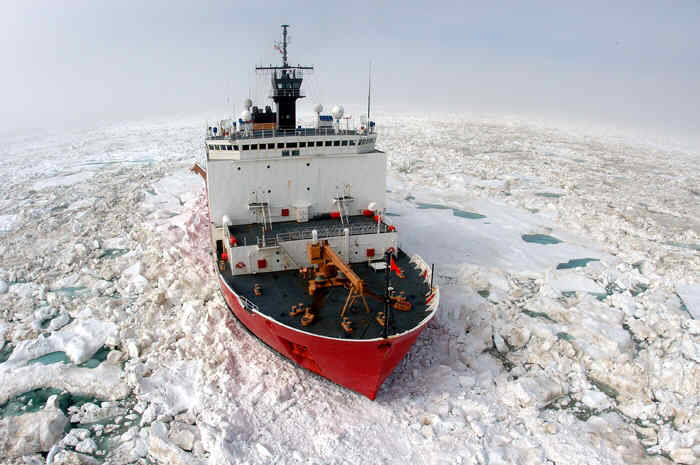 Life at Sea on a Coast Guard Icebreaker. Today is day 51 at sea onboard the Healy, I can't remember the last time I blow dried my hair or put on make-up, I have mastered the quick water conserving "sea shower," and can rise to my top bunk in just two quick steps. Life at sea is a lot like middle school summer camp and it's not just the bunk beds and cafeteria style dining -- it's living with a collection of characters, working together, and learning to rely on each other. Onboard the Healy are 51 scientists ranging in age from mid-20s to mid-60s with experience levels from graduate students to senior scientists. There are 93 Coast Guard crew members ranking from entry level seamen as young as 18, to officers, commanders, and of course the captain. Coast Guard members are stationed on the Healy for up to three years and work on the ship year-round whether in port or at sea. Gender balance within the science party is fairly even with 43 percent female, but women make up only 25 percent of the Coast Guard crew. Huffington Post Life at Sea on a Coast Guard Icebreaker. Today is day 51 at sea onboard the Healy, I can't remember the last time I blow dried my hair or put on make-up, I have mastered the quick water conserving "sea shower," and can rise to my top bunk in just two quick steps. Life at sea is a lot like middle school summer camp and it's not just the bunk beds and cafeteria style dining -- it's living with a collection of characters, working together, and learning to rely on each other. Onboard the Healy are 51 scientists ranging in age from mid-20s to mid-60s with experience levels from graduate students to senior scientists. There are 93 Coast Guard crew members ranking from entry level seamen as young as 18, to officers, commanders, and of course the captain. Coast Guard members are stationed on the Healy for up to three years and work on the ship year-round whether in port or at sea. Gender balance within the science party is fairly even with 43 percent female, but women make up only 25 percent of the Coast Guard crew. Huffington Post
Myths About Shell's Arctic Alaska Pullout Persist. When Royal Dutch Shell announced that it had lost its big-money bet in the Chukchi Sea and would end its entire program in the offshore U.S. Arctic, the hyperbole and finger-pointing began in earnest. Rep. Don Young accused President Obama and Interior Secretary Sally Jewell of deliberately sabotaging Alaska's economy. "I'm sure somewhere Sally Jewell and President Obama are smiling and celebrating Shell's decision to cease operations off the coast of Alaska," Young said in a statement issued just after Shell's announcement. Alaska Dispatch News
Ice Still Thick and Old in Northwest Passage: New Study. Wait for another 40 years, and then - maybe - the Northwest Passage will be truly navigable for shipping traffic during the summer. A new study on ice thickness in the passage show there's still a lot of thick, multi-year ice to be found in the channels between the Arctic islands in the warmer months. "Results indicate that even in today's climate, ice conditions must still be considered severe," says the study, Ice Thickness in the Northwest Passage, published Sept 25 in Geophysical Research Letters. Nunatsiaq Online
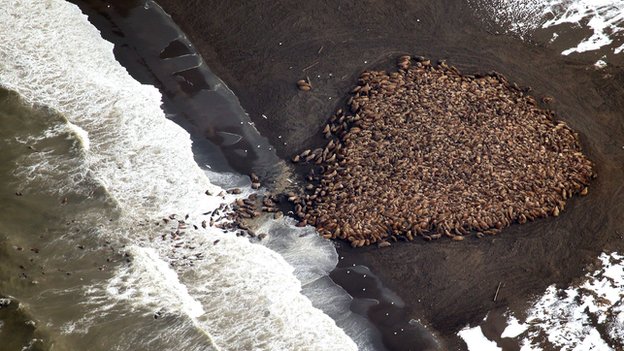 Old Walrus Bones Dug Up in Alaska's Arctic Could Shed New Light on Point Lay Haulouts. At a lab in Barrow, University of Alaska Fairbanks researchers are sawing into old Pacific walrus bones unearthed at a site on the Arctic coast. They're hoping to find DNA, stress hormones and isotopes of carbon and nitrogen, which could tell them about everything from population sizes to the walruses' shifting diet. This evidence will help managers determine how resilient the animal can be in the face of a changing climate -- which is already affecting the Chukchi Sea ice they used to haul out on during late summer and early fall. Alaska Dispatch News Old Walrus Bones Dug Up in Alaska's Arctic Could Shed New Light on Point Lay Haulouts. At a lab in Barrow, University of Alaska Fairbanks researchers are sawing into old Pacific walrus bones unearthed at a site on the Arctic coast. They're hoping to find DNA, stress hormones and isotopes of carbon and nitrogen, which could tell them about everything from population sizes to the walruses' shifting diet. This evidence will help managers determine how resilient the animal can be in the face of a changing climate -- which is already affecting the Chukchi Sea ice they used to haul out on during late summer and early fall. Alaska Dispatch News
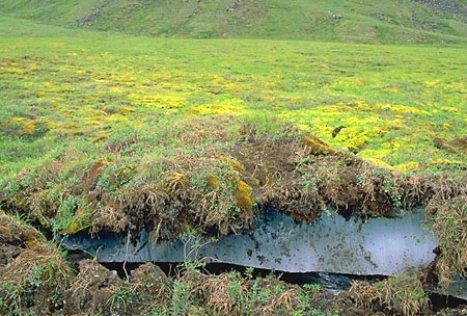 Permafrost-Eating Bacteria: A New Twist on Thawing Arctic and Global Warming. Global warming is accelerating the thawing of permafrost - soil that has been at or below the freezing point of water for approximately two or more years. This releases the potent greenhouse gas methane to the atmosphere. This direct release of methane (the main component in natural gas) occurs when methane-producing bacteria consume organic matter in the rotting soil that has been stored in permafrost over the millennia. Thus, many scientists predict large releases of methane from these sources as a result of global warming. This is likely what you have already heard about permafrost. Indeed, most of the recent news and interest about permafrost thawing is associated with Arctic and Antarctic regions, even though alpine permafrost does exist in low latitudes as well. The Conversation Permafrost-Eating Bacteria: A New Twist on Thawing Arctic and Global Warming. Global warming is accelerating the thawing of permafrost - soil that has been at or below the freezing point of water for approximately two or more years. This releases the potent greenhouse gas methane to the atmosphere. This direct release of methane (the main component in natural gas) occurs when methane-producing bacteria consume organic matter in the rotting soil that has been stored in permafrost over the millennia. Thus, many scientists predict large releases of methane from these sources as a result of global warming. This is likely what you have already heard about permafrost. Indeed, most of the recent news and interest about permafrost thawing is associated with Arctic and Antarctic regions, even though alpine permafrost does exist in low latitudes as well. The Conversation
|
Legislative Action
No Arctic legislation was formally considered Friday.
|
|
Future Events
Resources for the Future and the Stanford Woods Institute for the Environment are hosting a seminar to understand the science behind increased shipping and the related impacts on marine life, ecosystems, and the communities that depend on them. Among the speakers will be Dr. Lawson Brigham, from the University of Alaska Fairbanks, an advisor to the USARC, and Ms. Denise Michels, Mayor of Nome, Alaska. Registration required. Available as webcast too.
The Arctic Circle is the largest global gathering on the Arctic. It is attended by heads of state and governments, ministers, members of parliament, officials, experts, scientists, entrepreneurs, business leaders, indigenous representatives, environmentalists, students, activists, and others from the growing international community of partners and participants interested in the future of the Arctic. The Arctic Circle highlights issues and concerns, programs, policies and projects; it provides platforms for dynamic dialogue and constructive cooperation. While the plenary sessions are the responsibility of the Arctic Circle, the breakout sessions are organized by various participating partners in their own name and with full authority over the agenda and the choice of speakers.
Penn State University will host an afternoon panel of national experts in the Arctic and in US interests in the region. Building on the law of the sea expertise of VADM James Houck (former Navy Judge Advocate General and now Interim Dean of the Law School and School of International Affairs at Penn State) and the knowledge of the changing Arctic environment of RADM David Titley (former head of the Navy's Task Force Climate Change and now professor from practice in the Department of Meteorology), the panel brings together experts in science, law, policy, and Arctic diplomacy. We see these experts individually at events in Washington, but Penn State is doing a great service in bringing them altogether at one event in an region that seldom gets such first hand expertise. Chair of the US Arctic Research Commission Fran Ulmer is a keynote speaker.
The Polar Oceans and Global Climate Change, November 3-6, 2015 (La Jolla, California USA). The American Polar Society will host this Symposium at Scripps Institution of Oceanography. A flyer with a partial list of presenters is available on the Society's website (americanpolar.org) and from the Society's Membership Chairman by email.
Forum for Arctic Modeling and Observational Synthesis Meeting, November 3-6, 2015 (Cape Cod, MA, USA). On November 3rd, the 2015 School for young scientists will consider "Regional Oceanography of the Arctic marginal seas" with lectures covering major features of atmospheric, sea ice and oceanographic regimes of the: Bering, Chukchi, Beaufort, East-Siberian, Laptev Sea, Kara, Barents and Nordic seas. On November 4-6, the meeting portion will summarize project accomplishments for the last 3 years of activities and will focus on the formulation of scientific questions and directions for FAMOS future research (2016-2019) to: (a) improve Arctic modeling, employing very high resolution models; (b) develop and test new arctic monitoring/observing systems and (c) improve predictions of Arctic environmental parameters with reduced uncertainties.
Due North: Next Generation Arctic Research & Leadership, November 5-8, 2015 (Calgary, Alberta, Canada). The Association of Canadian Universities for Northern Studies (ACUNS) will convene an interdisciplinary conference of early career scientists working on Arctic issues. Topics will include: Arctic Communities, Arctic Sustainable Development, Arctic Wildlife, Ecosystem and Biodiversity, Arctic Food Security, Arctic Landscapes, Climate Change and Adaptation, Disaster Risk Management, Policy, Politics and Leadership, Arctic Environment (Data and Techniques), Arctic Resources, and Future of Arctic.
Matchpoints Seminar, November 12-13, 2015 (Aarhus, Denmark). The purpose of the conference is to provide a forum for policy-makers and academics to deliberate on how the security, resilience and sustainability of the globalized Arctic region and its peoples may be enhanced, and what instruments of governance may most suitably contribute. The conference will spell out (1) how the different relevant dimensions of security (military, economic, environmental, energy and human security) manifest themselves in the governing / governance arrangements in the Arctic; (2) how the challenges associated with each manifest themselves, individually and together; and (3) what forms of governing arrangements can best help to address the challenges. The conference will also focus on (4) how the Nordic countries and nations, including Greenland, the Faroe Islands and Aaland Islands, may contribute to the peace, stability and prosperity of the Arctic region through collaborative efforts based on their shared social, human, environmental and democratic values.
Arctic Observing Open Science Meeting, November 17-19, 2015 (Seattle, Washington). The Arctic Observing Open Science Meeting will be 2.5 days and held at the Hyatt at Olive 8 in Seattle, Washington. The conference will bring together individuals and teams involved in the collection, processing, analysis, and use of observations in the Arctic - from academia, agencies, industry, and other organizations. The meeting will be convened as a combination of plenary talks, parallel science sessions, and a poster session. The agenda and registration information will be forthcoming.
In the Spirit of the Rovaniemi Process 2015, November 24-26, 2015 (Rovaniemi, Lapland, Finland).When the Arctic Environmental Protection Strategy, the so-called Rovaniemi Process, was adopted in 1991, it aimed at overcoming divisions and turning the zone of Cold War military tensions into a region of peace and co-operation. In this joint effort focusing on the protection of environment, and later, sustainable development, the Arctic states supported by indigenous organizations laid grounds for institutionalized collaboration and the emergence of Arctic regional identity. The second international conference will bring together decision-makers, scholars, artists, designers and students to address these questions and discuss the Arctic in global, regional and local perspectives.
Arctic Encounter Paris (AEP 2015), December 11-12, 2015 (Paris, France) (During the UN Convention on Climate Change - COP21). The Arctic Encounter Paris will take place at the French Senate at Luxembourg Palace and the 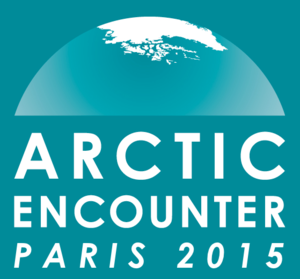 French Military College, École Militaire, in Paris, France, on the final days of the monumental United Nations Convention on Climate Change (COP21) where thousands of global citizens and government delegates will be gathered to deliberate the world's response to our changing planet in Paris. The AEP is the only Arctic policy side event currently planned to take place during the UN Convention. A reception will take place following the closing panel. French Military College, École Militaire, in Paris, France, on the final days of the monumental United Nations Convention on Climate Change (COP21) where thousands of global citizens and government delegates will be gathered to deliberate the world's response to our changing planet in Paris. The AEP is the only Arctic policy side event currently planned to take place during the UN Convention. A reception will take place following the closing panel.
This symposium is part of an ongoing initiative of the National Academies of Science Polar Research Board to expand public understanding of why the dramatic changes affecting the Arctic region ultimately matter to us all. The agenda features engaging presentations and discussions with top Arctic science and policy experts, and displays and interactive exhibits that illustrate Arctic change and its global impacts. The event is free and open to the public. There are sponsorship opportunities, and a call for exhibitor applications (by Oct.31, 2015). Audience space is limited, so register today; and please encourage your friends, neighbors, and colleagues to participate-as our goal is to reach well beyond the small circle of specialists who typically attend Arctic-themed events in the DC area. The U.S. Arctic Research Commission is helping to sponsor this event.
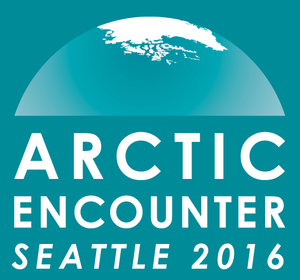 Building upon the preceding Arctic Encounter event in Paris, the third annual Arctic Encounter Symposium (AES) in Seattle, Washington will convene policymakers, industry leaders, and leading experts to confront the leading issues in Arctic policy, innovation, and development. As the largest annual Arctic policy event in the United States, the AES mission is to raise awareness, engage challenges, and develop solutions for the future of a region and a people. The two-day program includes two keynote luncheons, expert plenary sessions, break out sessions, a networking cocktail reception and seated dinner. A closing reception will take place at the conclusion of the program. Building upon the preceding Arctic Encounter event in Paris, the third annual Arctic Encounter Symposium (AES) in Seattle, Washington will convene policymakers, industry leaders, and leading experts to confront the leading issues in Arctic policy, innovation, and development. As the largest annual Arctic policy event in the United States, the AES mission is to raise awareness, engage challenges, and develop solutions for the future of a region and a people. The two-day program includes two keynote luncheons, expert plenary sessions, break out sessions, a networking cocktail reception and seated dinner. A closing reception will take place at the conclusion of the program.
|
|

  
4350 N. Fairfax Drive, Suite 510
Arlington, VA 22203, USA
External links in this publication, and on the USARC's World Wide Web site ( www.arctic.gov) do not constitute endorsement by the US Arctic Research Commission of external Web sites or the information, products or services contained therein. For other than authorized activities, the USARC does not exercise any editorial control over the information you may find at these locations. These links are provided consistent with the stated purpose of this newsletter and the USARC Web site.
|
|
|
|
|
|
|
|
|